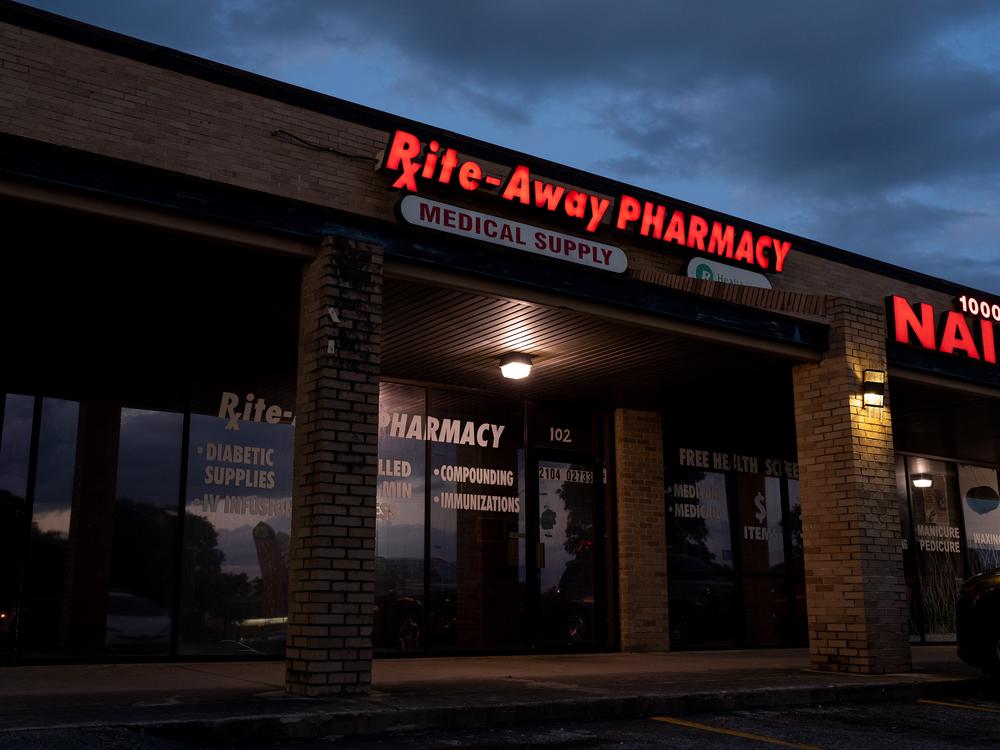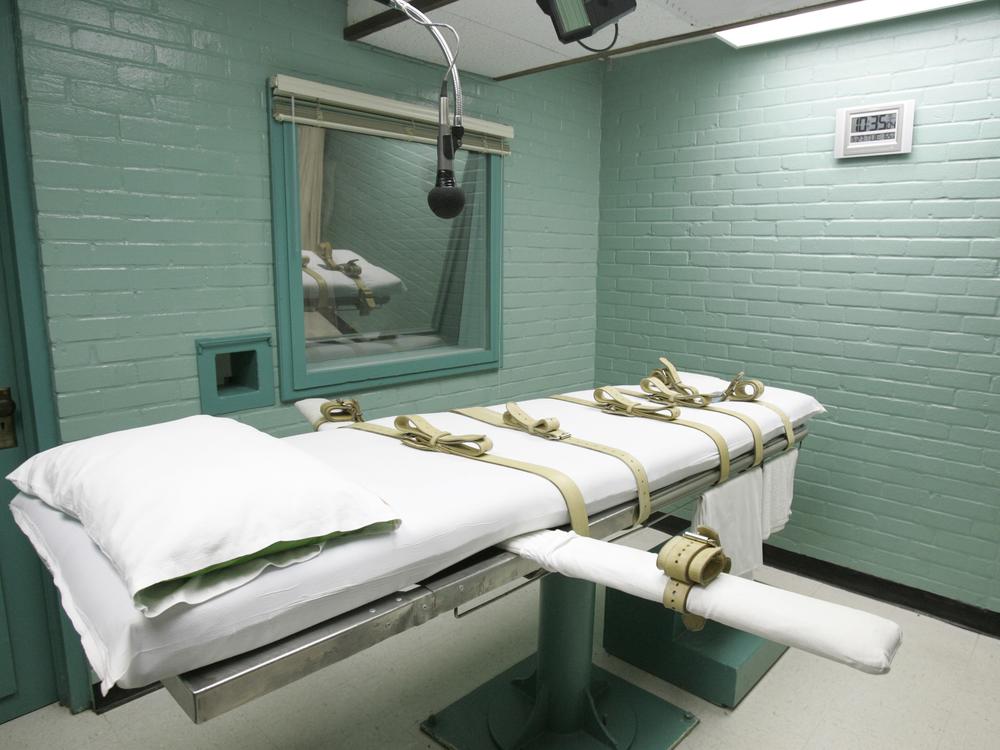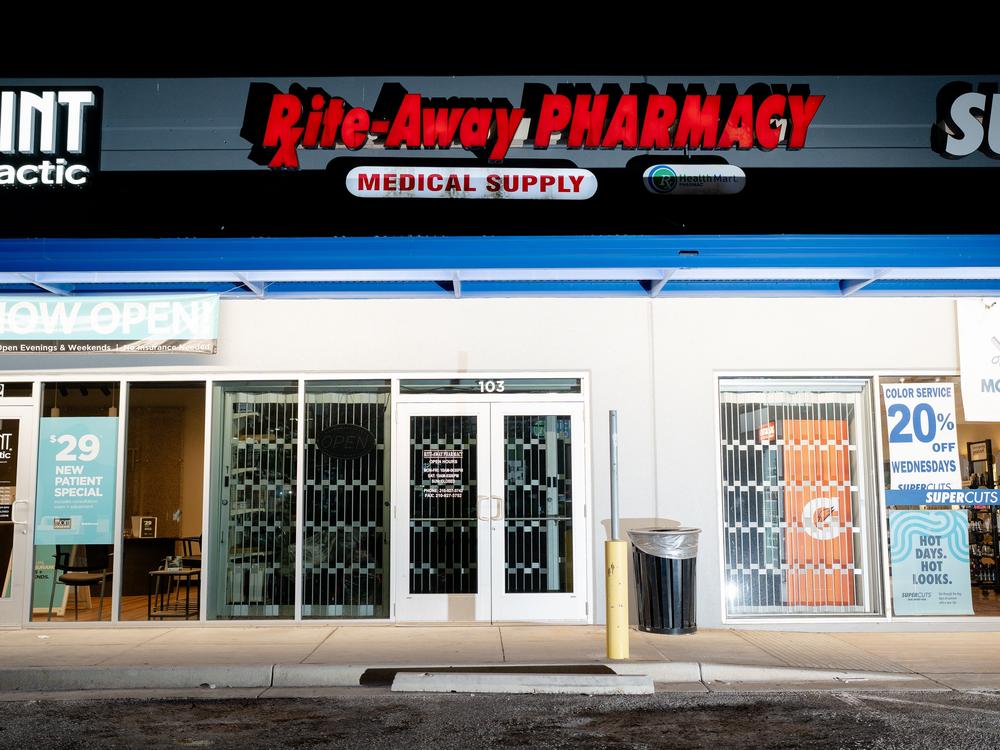Section Branding
Header Content
Unmarked cars and secret orders: How a pharmacy prepared drugs for Texas’ executions
Primary Content
The state of Texas, blocked from purchasing lethal injection drugs by major pharmaceutical companies that refuse to participate in executions, bought them instead from an in-state compounding pharmacy with a history of more than a dozen safety and cleanliness violations, NPR has learned.
Rite-Away Pharmacy and Medical Supply in suburban San Antonio produced injectable pentobarbital from 2019 through at least late 2023 for Texas to use in executions, records from the state Department of Criminal Justice and the federal Drug Enforcement Administration revealed.
According to inspection documents from the Texas State Board of Pharmacy, Rite-Away was cited more than a dozen times over the past decade. Over the course of multiple inspections, the pharmacy repeatedly failed to maintain clean and sterile facilities and failed to keep complete and correctly labeled records and drugs in stock, among other violations.
Federal authorities alleged that another Rite-Away branch, owned by the same family, “fueled and profited from the opioid epidemic” and was implicated in the overdose death of a patient.
Death penalty opponents say the revelations raise questions about whether the state is being cavalier in its treatment of inmates it intends to execute.
“They're literally relying on those who have been known to cause harm to carry out their death penalty, their execution,” said Bianca Tylek, a lawyer and the executive director of a nonprofit that advocates against exploitation of prisoners. “They are exhibiting a tremendous amount of carelessness that should never come into contact with the death penalty.”
In an interview with NPR, one of the owners of the pharmacy, Rohit Chaudhary, confirmed Rite-Away’s involvement with the sale of injectable pentobarbital to Texas. Officials with the Texas Department of Criminal Justice declined an interview with NPR and declined to comment.
The pharmacist who said he prepared the pentobarbital at the Rite-Away in the Thousand Oaks suburb of San Antonio confirmed that an employee from the state approached him seven or more years ago to ask if the pharmacy would make the drug for Texas. NPR agreed not to name the pharmacist, who no longer works at Rite-Away, because he said he fears professional repercussions.
The Rite-Away branch where the drugs were prepared is a compounding pharmacy, which means it can create drugs in-house from raw ingredients. Multiple states, including Texas in the past, have turned to compounding pharmacies to prepare their supplies of execution drugs from raw materials.
Since they make drugs to order, the pharmacies can be helpful for people who are allergic to ingredients in medicines that are mass produced. But the finished drug products are not approved by the FDA, and the FDA has acknowledged that it has “observed troubling conditions during many of its inspections of compounding facilities including toaster ovens used for sterilization, pet beds near sterile compounding areas, and operators handling sterile drug products with exposed skin, which sheds particles and bacteria, among many others.” Poorly compounded drugs have led to serious patient injury and death.
After Rite-Away agreed to make the pentobarbital injections, a state representative started hand-delivering small amounts of the active ingredient in pentobarbital, in powder form, to Rite-Away, the pharmacist said. The powder came in a bag stamped with a photocopied label that he guessed came from the original container, he said. The pharmacist said he figured the state purchased the larger stash from a “chemical company.”
“The most important logo on something like that is the thing that shows the federal drug schedule on it,” the pharmacist said. “And it was always clearly marked as it is.”
But the employees made the deliveries in cars that were not marked at all, he said. The vehicles they came in when delivering the powder looked like their personal ones, the pharmacist remembered. They were not marked as property of the Department of Criminal Justice.
“I don't remember any of them ever coming in a DOC vehicle,” the former Rite-Away employee said, “because, again, that would attract attention.”
The pharmacist said he was the one who processed the regulatory paperwork for the pentobarbital, a controlled substance, when the powder arrived. Then he combined the necessary ingredients inside the pharmacy’s sterile room to make the product that could be injected into prisoners.
Sterile injectables are harder to compound than pills; purity and sterility standards need to be high because the pharmaceutical products are inserted directly into veins. Still, the pharmacist said the formula itself wasn’t overly complex. It consisted of four basic ingredients: sterile water, a synthetic liquid substance, alcohol and the pentobarbital powder from Texas.
Only Chaudhary, the pharmacy owner, and a few other staff members knew what he was doing.
“No one has a microscope on you,” said the pharmacist. “For most of the other people that were there, there was just no need to know because it would just attract more and more and more attention. And we definitely wanted to keep that low-key.”
The pharmacy charged the state less than $100,000 in total, the pharmacist said.
“Maybe two or three hundred a bottle and we wouldn't do more than about 10 at a time,” he added. “I even had the guys from the DOC saying, you know, you can charge more for this.”
The pharmacist said the work did trouble him, but he eventually made peace with it.
“I guess I satiated my guilt, to whatever degree I experienced it, with the knowledge that whatever they did was deserving of capital punishment,” he said. “And I'm not the one who decided that they would get that punishment. I was just the one that provided the means for it.”
The violations found recently by inspectors from the Texas State Board of Pharmacy were “faux pas for anyone trained in sterile prep,” the pharmacist said, and he confirmed that there was “a tech that came out of the room and went back in and didn't de-gown or anything like that.”
He downplayed the issues, though, and said he made the pentobarbital injections for Texas carefully.
But the Rite-Away pharmacy where the execution drugs were prepared wasn’t the only one with problems.
In 2022, the U.S. Department of Justice sued another San Antonio Rite-Away office that is also owned by members of the Chaudhary family. Lawyers asserted that it broke federal law for years by dispensing powerful opioids to people without valid prescriptions, falsifying hundreds of prescriptions for controlled substances and ignoring serious red flags that indicated people intended to abuse their medications. One woman died from an overdose shortly after the pharmacy filled her fentanyl prescription despite red flags, attorneys for the federal government alleged.
A federal court ordered Rite-Away and the pharmacist in charge, Jitendra Chaudhary, to stop the illegal activity and pay a $275,000 penalty. The pharmacy and Chaudhary agreed to pay the fee in the civil suit but denied liability.
The use of execution drugs prepared in compounding pharmacies has raised issues for some prisoners and their attorneys, who have argued that injecting drugs in poor condition into prisoners' veins could violate their constitutional protection against cruel or unusual punishment. Compounded drugs have a shorter shelf life than conventionally manufactured drugs. Instead of throwing out old doses of pentobarbital, however, the Texas Department of Criminal Justice has been known to retest old vials of pentobarbital, then relabel them with updated “beyond-use” dates, similar to expiration dates.
Lethal injections in Texas have not always gone according to plan. Witnesses at the 2018 execution of Texan prisoner William Rayford said that after he was injected with pentobarbital, he writhed and jerked on the gurney as he died. As they were dying, other prisoners have said they felt like the drug was burning them.
A 2020 NPR review of more than 200 autopsies of people executed by lethal injection across the U.S. found that most bodies showed evidence of pulmonary edema, a condition where the lungs are filled with fluid that can cause people to feel like they’re suffocating and drowning. NPR did not analyze autopsies from Texas since the state does not conduct autopsies after executions.
Texas plans to execute prisoner Ruben Gutierrez with pentobarbital on July 16 and has four more executions scheduled later.
When NPR asked whether the state intends to use drugs prepared by Rite-Away to stop Gutierrez’s heart next week, the Department of Corrections declined to comment.



